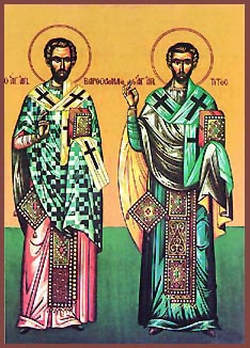 When I was young my favorite passage of Scripture reflected St. Paul’s attitude toward his young protégé, Timothy: “Let no one have contempt for your youth, but set an example for those who believe, in speech, conduct, love, faith, and purity.” (1 Tim 4:12) It was very consoling to me at times when I had something to offer and felt that others did not think I had the ability or understanding for the situation. When I was relatively new at being a spiritual director I would often experience a subtle attitude of disappointment from people who were assigned to me during their retreat. I knew the unspoken sign that said: “What could this young woman possibly have to offer me?” I would try to be gracious, suggesting that if the person wanted a different director I could arrange it, otherwise I would be happy to meet with them. This did not happen every time, but it would happen often enough. I was only in my mid 20’s and looked younger than I was, so I understood to a certain extent. I knew all of us want someone who has experience when we are in need of a service. Yet we have to realize that everyone has to get experience somehow. We all have to begin somewhere, sometime, somehow, don’t we? This week we celebrate the feast of Saints Timothy and Titus who were bishops in the early Church, appointed by Paul and entrusted with great responsibilities. We really do not know much about Titus except that he was mentored and sent forth by Paul, entrusted with some rather difficult ministerial tasks. Of Timothy, we know he traveled with Paul while still a youth and was empowered to be a bishop while rather young. Both men responded to a call to service and were trained by Paul, and both men had very difficult jobs to do in large cities as leaders of new churches which were in great need of education and discipline.  St. Titus was of Greek gentile origin. Paul helped him to use this lineage to his advantage as he dealt with gentile converts to Christianity. He was sent to Corinth to bring them Paul’s very ‘pointed’ and almost severe letter; the Corinthian church was no doubt the most difficult community in the early church because they were very attached to pagan ways which were not in accord with gospel values. There Titus taught the people the proper way to live according to the message of Jesus and helped them heal that which divided the community. Finally he was sent to the church in Crete, where he was said to be an excellent administrator and peacemaker. He taught and appointed presbyters (priests) and bishops and he was very well respected as a leader. Paul obviously relied greatly upon Titus and the gifts he was able to bring to ministry. St. Timothy was the son of a Greek father and a Jewish mother, so he had understanding he could apply to both Jewish and gentile converts to Christianity. St. Paul saw that he was filled with great potential and began to teach him when Timothy was still a boy. As a youth he accompanied Paul on his second and third missionary journeys. This not only gave him exposure to the church as someone destined for leadership, but he also was able to learn from Paul through participation in his ministry. He began to preach during this time, which in those days was incredibly unusual for one so young. Therefore it is clear that Paul had a great deal of trust in the ability of Timothy. Paul sent him on many journeys to spread the faith and it seems he received the most difficult tasks of all of Paul’s protégés. He was with Paul when Paul was under house arrest, and was himself arrested at some point during his own ministry. We know that when Timothy became bishop of the entire church in Ephesus he was still young enough to struggle with credibility issues. In those days his youth would have been significant because old age was associated with wisdom and youth was associated with ‘being seen and not heard,’ more or less. Therefore he must have had great gifts in order to overcome the stereotypes which he faced when he was young.  As I said earlier, it was Paul’s comment to Timothy (quoted above) which was helpful for me when I was a young spiritual director. While I did not have the kind of responsibility which Timothy held, a spiritual director is entrusted with the inner life of another person and this is an incredible trust. One time when a considerably older woman than I was assigned to me during her retreat, and I saw that she seemed disappointed, I offered her the “out” previously mentioned. To her credit she said she would stay with me. Of course, I cannot reveal what she said to me, but I can say that she shared something which was similar to a great suffering I had experienced earlier in my life. I do not remember what I said to her during that meeting, but whatever it was, at the end of our session she confessed to me that she had indeed thought I was too young to ever understand what she wanted to talk about. She said she was amazed, however, that not only did I seem to understand, but that what I said was very helpful. (During direction it is not appropriate for the director to talk about him or herself, so I did not say that I had a similar experience. She could never have known that I had “been there.”) She had underestimated that a young person could have experiences that can help others, though I think she realized that one should not make such an assumption. I imagine that is what Timothy experienced in attempting to accomplish his difficult tasks. St. Paul had the wisdom to know Timothy would encounter resistance merely because of his youth, so he continually encouraged him to “hang in there,” relying on the gifts God gave him. This is not wisdom only for young people; it is wisdom for all people. All of us have been given a mission by nature of our baptism. That mission is to bring Jesus and His gospel message to all those whom we encounter. We are to teach by word and deed. Paul told Timothy to set an example for all those who believe by being a leader who practiced what he preached. If we live the gospel then we, too, will not only practice what we preach, but we will often preach without needing words.  If we emulate Timothy and Titus and bring the light of our love into the lives of the suffering, we can do much to alleviate pain. We can be like Titus, of whom Paul said, “For even when we came into Macedonia, our flesh had no rest, but we were afflicted in every way—external conflicts, internal fears. But God, who encourages the downcast, encouraged us by the arrival of Titus...” (2 Corinthians 2:12a, 13; 7:5-6). We do not have to be gifted preachers like Timothy, though I believe all of us are potentially gifted ‘preachers’ through the love which we share. Encouraging the downcast takes no special talent: it is simply about being present to those who need our help. It is about loving and caring for those in need. Many suffer losses and are grieving: some suffer through the betrayal of others, others through loss of health or a job; some struggle to make ends meet and others are lonely or neglected. Therefore, let us be like Titus, lightening burdens and bringing peace simply by reaching out and doing what we can. Let us be like Timothy, offering whatever gifts we have for organization and leadership, recognizing that we should not leave tasks we can do to some other person ‘out there.’ If we were given the gifts, then let us be the doer, encouraging others to work for peace and justice or bringing improvement to a community. And if we are the ones feeling a little beaten up by life, let us take to heart Paul’s suggestion to Timothy: “Stop drinking only water, but have a little wine for the sake of your stomach and your frequent illnesses.” (1 Tim 5:23) That is, we need to be willing to receive from others as well as to give. For a community to thrive, everyone needs to offer what they can.  Let us imitate Saints Timothy and Titus. Let us remember that there is a time for learning, but there is also a time of sharing the gifts we have. Every one of us can bring something to others, especially the gift of love. Let us be like St. Paul, encouraging the young to take responsibility for using their gifts. This is what building the Kingdom is about. The world has much that is broken within it, so we need to bring healing wherever we go simply by using the gifts we were given, taking up the mantle of these saints. May we be courageous in our example to those who are young, teaching them to use their gifts! May we be like St. Paul, accepting and nurturing the gifts of those who are gaining experience! May we work with one another, bringing what we can to those in need! May we pray for the grace to be like Saints Timothy and Titus, taking on the difficult work of loving and healing by being peacemakers and leaders! And may we trust in God who is the giver of all good gifts! Let us continue to meet in the heart of Jesus! Peace! ©Michele L. Catanese Note: Next post will be on February 12. Images: 1. The first icon is of Saints Timothy and Titus. 2. Next is a series of photos, all of which are mine. This one is of the shoreline on the Dingle Peninsula in Ireland. I chose it because it seemed like it could have been what St. Titus experienced on his travels to far off lands. 3.I took this at the diaconal ordination of some young men in my diocese. Due to their younger age I am sure they had the experience at some point, even after ordination, of being undervalued due to a perceived lack of "wisdom and age." And I am sure they took to heart the advice of St. Paul to Timothy, persevering in their ministries. 4. This is a sunset taken near Noto, Sicily. I chose this photo because it seems to me that at the end of the day, we need to reflect upon what transpired and offer thanks to God where we were blessed and ask for grace where we struggled. (That is to say, make a prayerful examination of the events of the day, such as the Ignatian Examen.) 5. The final image is called I Hold Out My Hand and My Heart Will Be In It, painted by Fr. William Hart McNichols. It can be found at https://fineartamerica.com/featured/i-hold-out-my-hand-and-my-heart-will-be-in-it-225-william-hart-mcnichols.html. If you are interested in obtaining it in one of a variety of mediums, including cards, the web address given will walk you through it.
Linda Dalferes
1/29/2018 07:13:20 am
Oh, my, 3rd paragraph from the bottom gave me things to think about in regard to my gifts & how I look at them. I need to believe God has given me those gifts, pursue them, & not "require" validation from others to accept the gifts. HARD! Sounds like an ego thing to me rather than a heart for service. Hmmmmm!
David
2/10/2018 04:51:03 am
Hello Linda, I feel led, somehow, to respond to your post. What I would like to say is this: true humility means accepting that each of us has been blessed with gifts from God. We are called to not only accept the gifts, but rejoice in them, using them for God's glory. If we use these gifts to somehow bring others closer to God, then surely it is not egotistical. I do tend to ramble, so I hope this makes sense. Blessings upon you.
David
2/10/2018 04:29:37 am
I find this post particularly powerful because of your appropriate sharing of personal experience, nicely blended with the message of Ss Timothy and Titus. As former high school teachers, you and I know that youth can be very capable of wisdom and insight - at times :) Comments are closed.
|
Heart Speaks to Heart
|

 RSS Feed
RSS Feed

